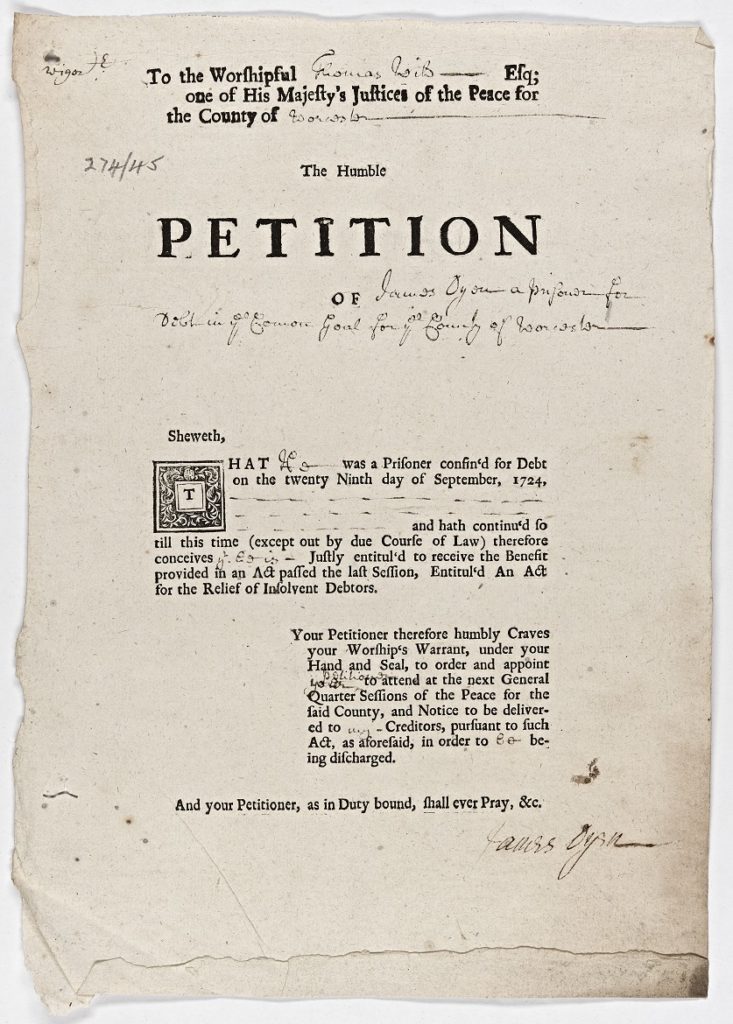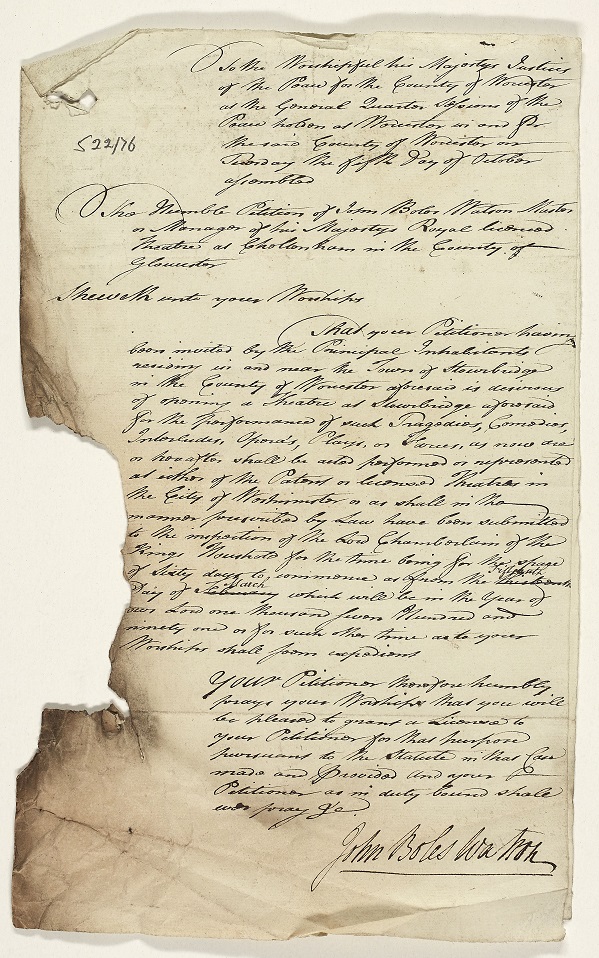Our final two sets of petitions to local magistrates have just been published on British History Online. The full transcriptions of 66 petitions to the magistrates of Worcestershire and 17 petitions to those of Cheshire are now free for anyone to read. These documents are not as numerous as our previously published sets, but they offer a new perspective on many ordinary peoples’ complaints and requests in the eighteenth century. When these are added to the volumes that we have already published, there are now transcriptions of 1,407 petitions to county quarter sessions available online from the 1570s to the 1790s.
The latest transcriptions all date to the eighteenth century, with some focusing on traditional concerns such as poor relief and petty litigation while other addressed new issues such as licencing religious dissenters and releasing imprisoned debtors. Many were presented by people who otherwise have left little trace on the historical record, so these texts can provide invaluable information about their lives and concerns.
Among the new transcriptions are several that stand out in various ways from the hundreds of others that we have been working on for this project. For example, perhaps the shortest petition we have in our collection is the request from a group of unnamed Protestant dissenters in Mobberley (Cheshire) to have a licence to worship in a local private house. Dating from 1758, the text of the petition itself is only 27 words, reminding us how routine this process could become over time.

Also notable is the number of printed petitions that appear in the eighteenth century. In 1720s Worcestershire, twelve of the seventeen surviving petitions are actually printed forms submitted by imprisoned debtors applying for release from gaol, with only the key personal details filled in by hand. These two are a reminder of the bureaucratisation of some aspects of the petitioning process, a trend that Naomi Tadmor has traced in the poor relief system at this same time.

However, my personal favourites in the new sets are the several petitions from the 1790s submitted to the Worcestershire magistrates asking for licences to open theatres in various local towns. John Boles Watson, manager of the Royal Theatre at Cheltenham, and William Meill, manager of the theatres at Worcester, Wolverhampton and Ludlow, each sought official permission to open theatres in Stourbridge and Great Malvern in this decade. Specifically, they wanted approval for ‘performance of such tragedies, comedies, interludes, opera’s, plays, or farces, as now are or hereafter shall be acted performed or represented at either of the patent or licensed theatres in the city of Westminster’. With a bit of further digging, one might be able to find out exactly what was being performed in this corner of the Midlands at the height of the Anglo-French wars, but for now the petitions still give a sense of the geography of the local cultural scene.

If you want to know more about petitioning in early modern England to better understand the context of these documents, you could start by reading our free ‘very short introduction’ and then move on to our ever-expanding annotated bibliography of published scholarship. Each volume also has an editorial introduction briefly reviewing who sent these petitions, the topics covered, their place in the archives, and more. In the case of Cheshire and Worcestershire, the previous volume introductions have been updated to reflect the addition of the new eighteenth century texts.
We will be publishing further guidance and advice on our Resources page, but for now you can just dive into the sources:
- Petitions to the Cheshire Quarter Sessions, 1573-1798, ed. Sharon Howard, British History Online
- Petitions to the Worcestershire Quarter Sessions, 1592-1797, ed. Brodie Waddell, British History Online
We would love to hear what you find! Remember that searching is currently by keyword only and spelling was very irregular in this period, so you may need to experiment. We will eventually have a more advanced search facility.
These volumes are truly a team effort. They were edited by Sharon Howard (Cheshire) and Brodie Waddell (Worcestershire), and both were transcribed by Gavin Robinson. Preparing the texts for online publication on British History Online was completed by Jonathan Blaney and Kunika Kono of IHR Digital.
We are extremely grateful to Worcestershire Archive and Archaeology Service and Cheshire Archives and Local Studies who supported the creation of these new transcriptions. We highly encourage readers to take advantage of their extensive collections to pursue further research on the individuals and communities mentioned in the petitions, or to view the original manuscripts. We are also grateful to the Arts and Humanities Research Council and the Economic History Society for their financial support, without which these would not have been possible.
These two volumes complete our publication of quarter sessions petitions, which also includes volumes for Derbyshire, Staffordshire and Westminster. We recently published a volume of petitions in the State Papers and will soon be publishing a volume of petitions to the House of Lords. Watch this site for further announcements.
